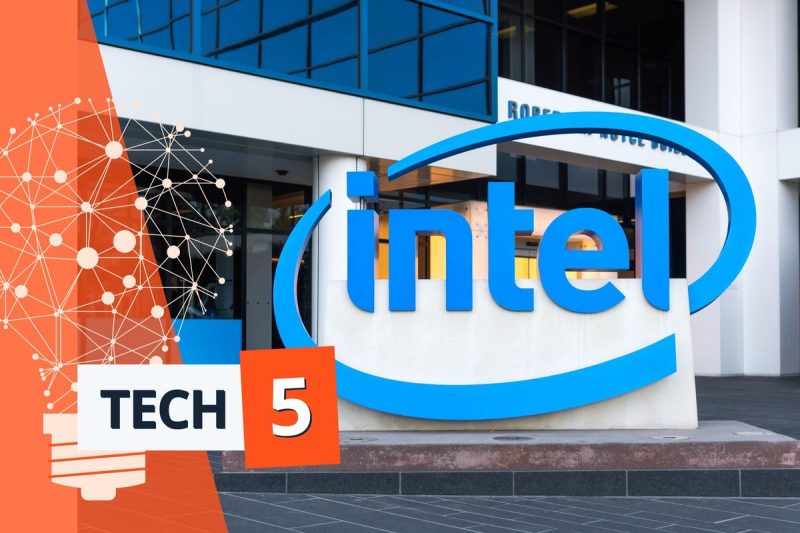Tech 5: Intel Faces M&A Rumors, Apple Debuts New iPhone

This week brought major moves in the tech space, including a new product release from Apple (NASDAQ:AAPL) and reports of a potential shakeup for Intel’s (NASDAQ:INTC) businesses.
Meanwhile, big things are brewing for two former OpenAI members, and Microsoft (NASDAQ:MSFT) has made a quantum leap. Plus, following a remarkable period of growth, Palantir (NASDAQ:PLTR) experienced an unexpected shift.
Read on to learn more about what happened during a busy week in the tech sector.
1. Apple debuts new iPhone 16e with advanced features
Apple rolled out a new device to the iPhone 16 lineup on Wednesday (February 19), expanding its offerings with a budget-friendly option that doesn’t compromise on advanced functionality.
The more affordable iPhone 16e comes equipped with an advanced 2-in-1 camera system, Apple’s A18 chip — replacing the A17 chip found in iPhone 15 models — to enable Apple Intelligence. It also comes with the company’s new C1 modem, the first cellular modem designed entirely in-house, replacing Qualcomm’s (NASDAQ:QCOM) Snapdragon X70.
This move towards in-house components is expected to continue, with Apple analyst Ming-Chi Kuo predicting the company will also replace Broadcom’s (NASDAQ:AVGO) Wi-Fi chips with its own, starting with the iPhone 17 series.
According to Cult of Mac, an online publication that focuses on Apple news and product reviews, the C1 modem “integrates 4G, 5G, satellite and GPS radios in one chip”, representing a “brand-new direction for Apple silicon, alongside the company’s processors and other wireless chips.”
The modem helps enable the phone’s satellite features, which allow for emergency communication and location tracking even when outside cellular and Wi-Fi coverage. It also helps extend the phone’s battery life.
Pre-orders began on Friday (February 21) and the phones will be available for purchase next week.
Later, Apple wrapped up the week by announcing on Friday that it would include Apple Intelligence in visionsOS 2.4, the immersive Apple Vision Pro platform. The update will enable tools such as text composition from ChatGPT and an Image Playground where users can create new images using AI. The changes are set to take place for English users in April, with features for additional languages rolling out gradually throughout the year.
Meanwhile, Bloomberg sources recently revealedthat the company has run into engineering problems and bugs that may delay the release of Apple’s promised overhaul of its digital assistant Siri, which was slated for April.
Sources claim that the update could now come in May or later.
The company also faces intensifying rivalry with Meta Platforms (NASDAQ:META), particularly in the emerging field of humanoid robots, as detailed in this piece from Bloomberg’s Mark Gurman.
2. Intel surges on acquisition rumors, then dips
Shares of Intel opened over 10 percent higher on Tuesday (February 18) after the Wall Street Journal reported over the weekend that rival chipmakers Taiwan Semiconductor Manufacturing Company (TSMC) (NYSE:TSMC) and Broadcom were both in talks to acquire different divisions of the company. According to the report, Broadcom is seeking Intel’s chip-design business, while TSMC is looking to acquire its chip-manufacturing unit.
Separately, Bloomberg reported on Monday (February 17) that Silver Lake Management was in talks to acquire a majority stake in Intel’s programmable chips unit, Altera, continuing the upward momentum.
The stock reached US$27.39 by the closing bell on Tuesday, nearly 14 percent higher than the closing price the previous Friday.
However, the majority of the company’s gains were promptly reversed on Wednesday after analysts voiced concerns over Intels’ potential break up and possible barriers to acquisition, such as different manufacturing processes. Regulatory scrutiny was also cited as a potential obstacle to any deal between Intel and TSMC.
And the Trump administration ‘could be wary of a foreign entity completely taking over an iconic US-firm,’ Bank of America analyst Vivek Arya wrote in a note to investors Tuesday, despite reports suggesting that the Taiwanese firm was considering the deal at the request of the Trump administration.
3. Ilya Sutskever’s SSI secures major investment
On Monday, Bloomberg disclosed a US$1 billion deal for OpenAI co-founder Ilya Sutskever’s start-up, Safe Superintelligence (SSI). Sutskever was formerly a chief scientist at OpenAI before leaving the company in May 2024.
Sutskever was a central figure in an attempt to remove OpenAI CEO Sam Altman from the company in November 2023; however, just days later Sutskever signed a letter demanding Altman’s return and said he regretted his participation.
He started SSI in June 2024, shortly after leaving OpenAI. The company focuses on building advanced artificial intelligence technology with safety features and has attracted significant interest from investors including Sequoia Capital, Andreessen Horowitz and DST Global, despite not yet generating revenue.
The latest funding round is led by venture capitalists at San Francisco-based firm Greenoaks Capital Partners, who have committed US$500 million, according to the report. Sources say the company is in talks to raise more than US$1 billion, potentially valuing the company at US$30 billion.
While Reuters provided details of the deal earlier in February, sources had previously valued the company at US$20 billion, a significant increase from its US$5 billion valuation following a funding round in September 2024.
Also this week, Mira Murati, another former OpenAI employee who previously served as the company’s chief technology officer, announced the name of her new venture, Thinking Machines Labs, via a blog post on Tuesday. Murati resigned from OpenAI in September 2024 after the company agreed to change its corporate structure, handing control to its for-profit arm as a stipulation of a US$6.6 billion funding round.
4. Palantir faces dual challenges
Shares of software company Palantir plunged by over 21 percent this week after Benzinga and other media outlets reported a regulatory disclosure on Wednesday, revealing CEO Alex Karp’s plan to sell nearly 10 million shares.
Later on Wednesday, the Pentagon announced it would cut roughly US$50 billion from its budget after it was ordered to reduce spending by 8 percent every year for the next five years last Friday by Defense Secretary Pete Hegseth. Cuts are likely to affect staffing as well as some weapons programs, according to NPR.
However, certain areas, such as border defense and spending on drones and submarines, will likely be exempt from the cuts or even receive increased funding.
“President Trump’s charge to the Department of Defense is clear: to achieve peace through strength,” wrote Robert G. Salesses, a senior Pentagon official, in a press release. “We will do this by putting forward budgets that revive the warrior ethos, rebuild our military, and reestablish deterrence.”
Palantir is a well-established defense contractor that works extensively with the US military. In December 2024, the company secured a US$401 million follow-on contract with the US Army to continue its work on the Vantage platform, an AI-powered data analysis tool used to improve decision-making and readiness. Its stock has seen remarkable growth, increasing by nearly 350 percent compared to its value a year ago.
5. Microsoft unveils new quantum chip
On Wednesday Microsoft unveiled its newest innovation, a quantum computing chip that the company claims can solve meaningful, industrial-scale problems in years, not decades.
Named Majorana 1, this chip stands apart from other quantum computing approaches due to its unique particles, which offer increased resilience against errors. Many qubits are incredibly sensitive to their environment, and tiny disturbances can cause them to lose their quantum information, resulting in computing errors.
Majorana 1 tackles this challenge with its unique architecture, where quantum information is distributed and protected, making it less susceptible to environmental disturbances and resulting in greater stability.
Microsoft refers to Majorana’s architecture as “topological,” which basically means the quantum information is encoded robustly, tied to the overall state of the system rather than individual parts.
This protection comes from the unique nature of the particles themselves: they’re Majorana particles, which are their own antiparticles—a very unusual property that contributes to their stability.
However, some researchers have cast doubt on whether Microsoft’s chips are capable of such stability.
Steven Simon, a theoretical physicist at the University of Oxford, UK, who was results at its research center in Santa Barbara, told Nature: “Would I bet my life that they’re seeing what they think they’re seeing? No, but it looks pretty good.”
He also said that there was no way to know from the experiment whether Microsoft had created qubits made of topological states. Notably, Microsoft previously claimed it had accomplished Majorana states in 2018, but later retracted its assertion in 2021 after further testing.
Still, Microsoft shares saw a boost after the press release, closing up 1.5 percent higher on Wednesday afternoon.
Securities Disclosure: I, Meagen Seatter, hold no direct investment interest in any company mentioned in this article.



